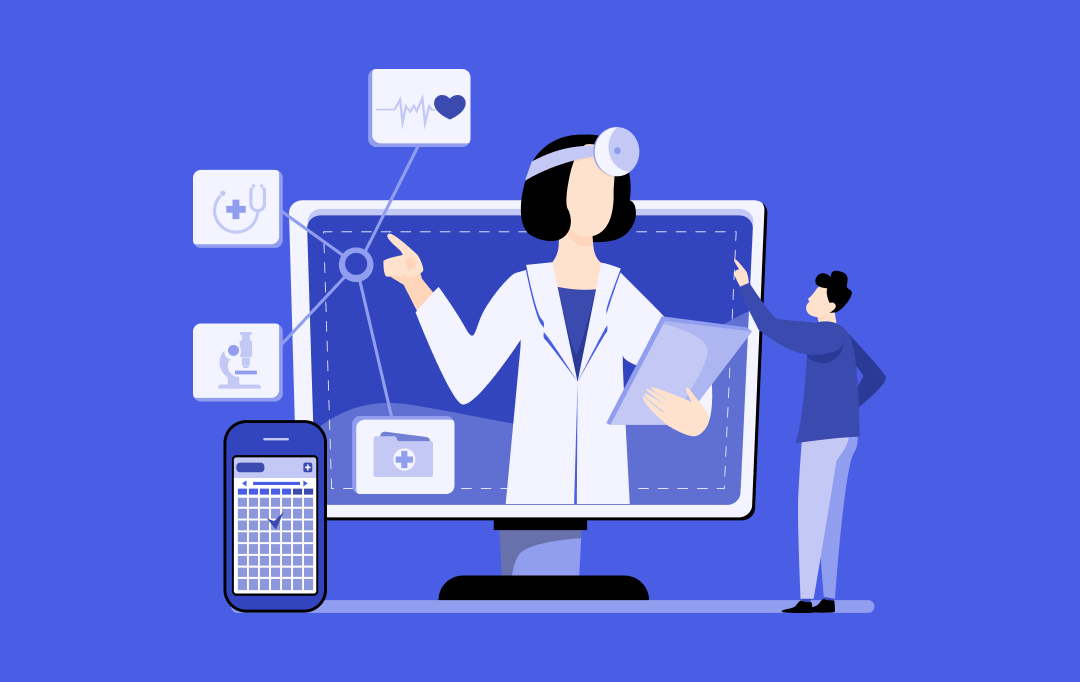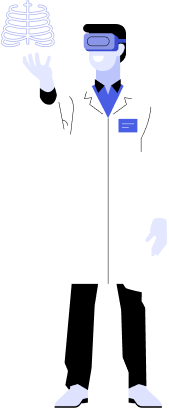- How Smart Technology in Healthcare Is Driving Efficiency in Smart Hospitals
- Internet of Things (IoT): A Network of Connected Devices
- Artificial Intelligence (AI): Smarter Decision-Making and Automation
- Cloud Computing: Scalable, Secure, and Efficient Data Management
- Blockchain: Secure and Transparent Data Management
- Robotics: Enhancing Surgical Precision and Operational Efficiency
- 5G Connectivity: Ultra-Fast Data Transfer and Communication
- Augmented Reality (AR) and Virtual Reality (VR): Enhancing Medical Training and Surgery
- Robotic Process Automation (RPA): Streamlining Administrative Tasks
- Digital Twin Technology: Simulating Hospital Operations in Real-Time
- What Are the Key Benefits of Smart Hospitals in Modern Healthcare?
- Streamlining Patient Flow and Bed Management
- Improving Clinical Decision-Making
- Reducing Administrative Burden
- Enhancing Patient Safety and Outcomes
- Boosting Operational Efficiency and Cost Savings
- Real-World Use Cases: How Leading Hospitals Are Powering Smarter Healthcare Operations
- Mayo Clinic – Leveraging Predictive Analytics in Cardiac Care
- Cleveland Clinic – Utilizing Digital Twins for Operational Excellence
- Mount Sinai Health System – Implementing AI-Powered Radiology Tools
- UnitedHealth Group (USA) – Advancing Telemedicine and IoMT Integration
- What Are the Biggest Challenges Smart Hospitals Face Today?
- Integration with Legacy Systems
- Data Privacy and Cybersecurity Risks
- High Upfront Investment and ROI Uncertainty
- Staff Training and Change Management
- Interoperability Between Systems
- Scalability and Infrastructure Readiness
- Patient Trust and Adoption
- How Healthcare Providers Can Get Started With Smart Hospital Transformation
- Assess Current Digital Maturity
- Set Clear Goals and KPIs
- Choose Scalable, Interoperable Technology
- Collaborate with Experienced Healthtech Partners
- Ready to Transform Healthcare Delivery with Appinventiv’s Smart Hospital Expertise?
- FAQs
Key takeaways:
- Smart hospitals use AI, IoT, and automation to improve patient care, streamline operations, and reduce costs.
- 75% of healthcare executives view digital and AI transformation as essential, with 82% expressing high satisfaction for investing in robotics and 81% in advanced analytics.
- IoT-enabled patient monitoring and AI diagnostics are revolutionizing clinical decision-making and reducing risks in real-time.
- Overall, Smart hospitals create proactive, data-driven environments that enhance patient care, optimize operations, and minimize risks.
Let’s be honest—navigating a traditional hospital can often feel like stepping into organized chaos. Long wait times, miscommunication between departments, duplicated paperwork, and overwhelmed staff are far too common. For patients and caregivers alike, this experience can be frustrating and, at times, even risky. But what if hospitals could think, predict, and act—just like a seasoned clinician?
Welcome to the world of smart hospitals.
These next-generation healthcare facilities are powered by a sophisticated mix of smart technology in healthcare, including AI, real-time data analytics, IoT, robotics, and automation. They’re not just about switching from paper to digital—they’re about building intelligent systems that learn, adapt, and optimize care delivery.
Imagine a hospital where patient vitals are monitored remotely 24/7, beds are automatically reassigned based on real-time acuity, predictive analytics prevent bottlenecks in emergency care, and AI assists in diagnosing illnesses with greater accuracy.
A 2025 McKinsey survey of 200 healthcare executives highlighted that 75% see digital transformation as essential to their future; however, insufficient resources and planning are making them fall behind.
A 2025 McKinsey survey of 200 healthcare executives highlighted that 75% see digital transformation as essential to their future; however, insufficient resources and planning are making them fall behind. Those who have invested in these areas report high levels of satisfaction, with 72% of digital adopters expressing positive outcomes. This is a prime example of the growing impact of smart technology on hospitals.
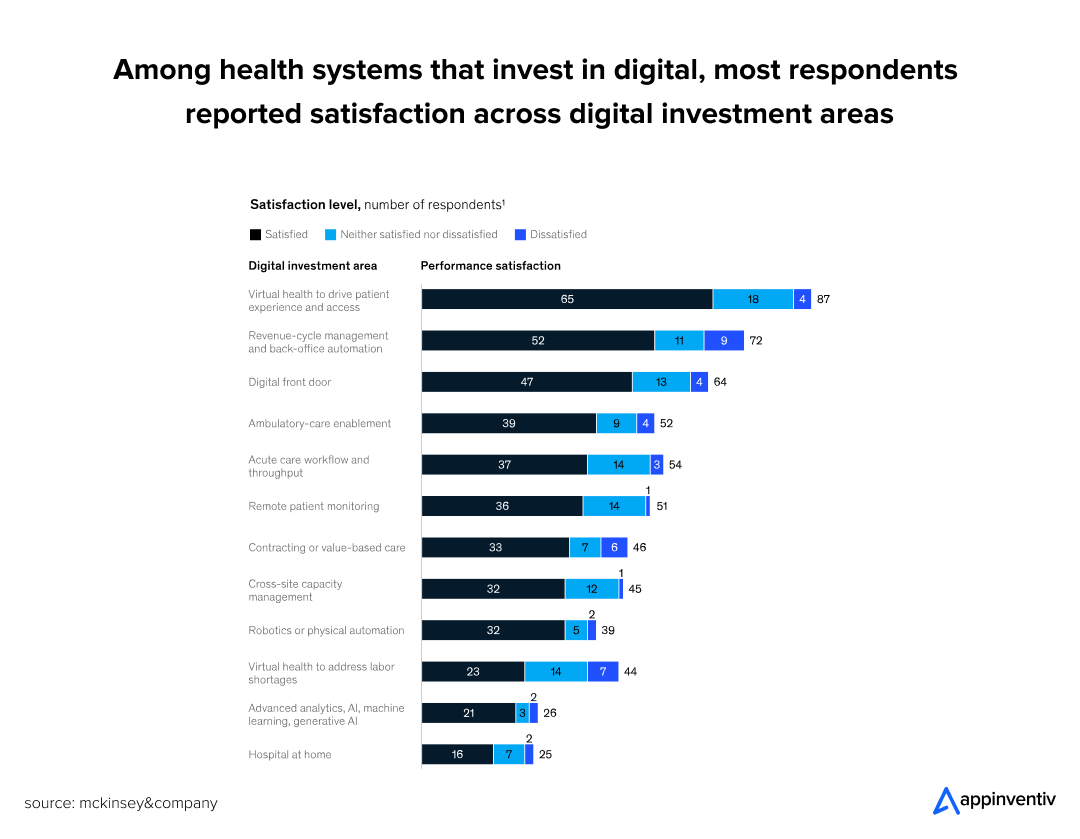
Those who have invested in these areas report high levels of satisfaction, with 72% of digital adopters expressing positive outcomes. This is a prime example of the growing impact of smart technology on hospitals.
This isn’t a distant vision—it’s a fast-emerging reality. Smart hospitals are redefining care by putting intelligence at the heart of every operation.
Smart hospitals are redefining care by putting intelligence at the heart of every operation, enabling seamless collaboration between departments, enhancing infection control through real-time environmental monitoring, and personalizing meal and medication schedules based on individual patient needs. These capabilities drive a more responsive and adaptive healthcare environment, where every detail is fine-tuned to improve patient comfort and clinical outcomes.
In this blog, we’ll explore how advanced technologies are transforming smart hospital operations—diving into their key benefits, real-world applications, implementation challenges, and steps to get started. Let’s take a quick walkthrough.
Are you all set to tap into this booming market?
How Smart Technology in Healthcare Is Driving Efficiency in Smart Hospitals
The role of technology in smart hospitals in driving efficiency cannot be overstated. From reducing administrative overheads to enhancing patient care, these technologies play a pivotal role in reshaping how healthcare systems operate. In this section, we examine the transformative impact of key technologies revolutionizing hospital operations.
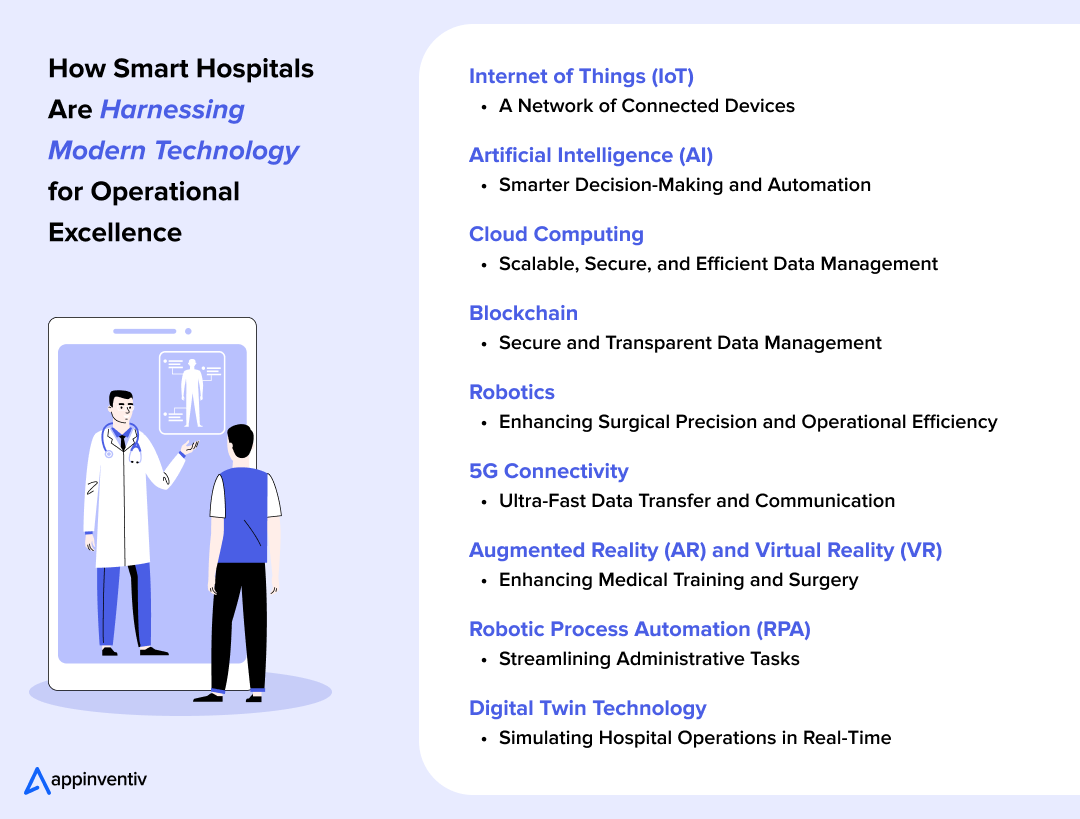
Internet of Things (IoT): A Network of Connected Devices
IoT serves as the backbone of smart hospital technology, enabling seamless interconnectivity between medical devices, patient monitoring systems, and administrative tools. This optimizes real-time data collection and management.
- IoT-Enabled Patient Monitoring: Continuous monitoring of vital signs such as heart rate, blood pressure, and oxygen levels, reducing the need for manual checks. This ensures timely interventions and prevents complications.
- Asset Tracking: IoT devices can track hospital assets (e.g., wheelchairs, IV pumps), making it easier to manage resources, reduce theft, and ensure that equipment is available when needed.
Also Read: Understanding the Impact of IoT in Healthcare
Artificial Intelligence (AI): Smarter Decision-Making and Automation
AI is at the forefront of healthcare innovation, enhancing both clinical and administrative functions within hospitals. With smart technology in healthcare, AI systems analyze data, provide predictive insights, and assist with diagnostic precision.
- Predictive Analytics: By analyzing patient data, predictive analytics in healthcare can forecast potential health risks and alert medical professionals to intervene before conditions worsen. This reduces emergency incidents and readmissions.
- AI in Diagnostics: AI in medical diagnosis is assisting doctors to analyze diagnostic images, such as MRIs or CT scans, to detect diseases early, leading to faster treatment and improved patient outcomes.
Cloud Computing: Scalable, Secure, and Efficient Data Management
Cloud-based smart hospital systems ensure secure, scalable storage of patient records and medical data. Healthcare providers can access data remotely, facilitating collaboration and improving decision-making. Cloud computing technology in healthcare allows providers to store patient records, medical histories, and treatment data in secure, scalable, and accessible environments.
- Real-Time Data Sharing: Healthcare professionals can access and share patient data remotely, ensuring timely, accurate decisions across departments and even between hospitals.
- Collaboration Tools: Cloud-based platforms enable seamless collaboration among medical teams, facilitating faster communication, consultations, and decision-making, ultimately enhancing the patient experience.
Blockchain: Secure and Transparent Data Management
Blockchain technology in healthcare is gaining traction in smart hospital systems, offering a secure and transparent way to manage patient records, reduce fraud, and ensure privacy.
- Improved Data Security: Blockchain ensures that patient data is stored securely, with access only granted to authorized personnel, mitigating concerns about data breaches.
- Streamlined Billing and Payments: Blockchain can also simplify the billing process, reducing administrative errors and ensuring transparent, secure payments.
Robotics: Enhancing Surgical Precision and Operational Efficiency
The integration of robotics is shaping smart hospital architecture, driving efficiency in areas like surgery and patient care. Robots assist in minimally invasive procedures, improving precision and reducing recovery times.
- Robotic Surgery: Robots can assist surgeons in performing precise operations with minimal invasiveness, leading to faster recovery times and fewer complications.
- Automated Pharmacy and Medication Management: Robotic systems are also used in dispensing medication, reducing human error, and ensuring accurate drug delivery.
5G Connectivity: Ultra-Fast Data Transfer and Communication
5G is central to the process for technology integration in hospitals, enabling ultra-fast data transfers and seamless real-time communication between devices, systems, and professionals.
- Real-Time Collaboration: Surgeons and specialists can collaborate in real time, no matter their location, enhancing decision-making.
- Instantaneous Data Transfer: Critical patient data, including medical imaging, can be transferred instantly between departments.
5G is central to the process for technology integration in hospitals, enabling ultra-fast data transfers and seamless real-time communication between devices, systems, and professionals. Learn more about 5G’s role in healthcare innovation and its transformative impact across medical facilities.
Augmented Reality (AR) and Virtual Reality (VR): Enhancing Medical Training and Surgery
AR/VR is becoming a vital element of smart hospitals, transforming how healthcare professionals train and conduct surgeries through immersive, data-rich experiences.
- Medical Training: AR and VR allow medical students and surgeons to practice procedures in a risk-free, virtual environment.
- Surgical Assistance: Surgeons can overlay critical patient data during procedures for greater precision.
Also Read: The Role of Virtual Reality in Healthcare
Robotic Process Automation (RPA): Streamlining Administrative Tasks
RPA in healthcare automates routine administrative tasks, such as patient scheduling, billing, and insurance verification, enabling hospital staff to focus on more value-added activities. RPA is a growing component in smart tech healthcare, automating repetitive administrative tasks to enhance operational efficiency and staff productivity.
- Automated Billing and Claims Processing: RPA speeds up claims processing, reducing errors and delays.
- Improved Resource Management: Automates staff scheduling and inventory management, ensuring hospitals can function smoothly.
AI-driven speech recognition tools for clinical documentation help clinicians dictate notes directly into the EHR, eliminating the need for manual data entry and significantly reducing administrative burden.
Also Read : How Much Does it Cost to Build a Medical Scheduling Software?
Digital Twin Technology: Simulating Hospital Operations in Real-Time
The use of digital twins in healthcare enables predictive maintenance, resource optimization, and informed decision-making, ultimately leading to enhanced operational efficiency and improved patient outcomes. This technology helps in creating real-time virtual replicas of hospital systems to improve operations and planning.
- Predictive Maintenance: Hospital equipment and infrastructure can be monitored virtually to predict failures and reduce downtime.
- Operational Optimization: By analyzing the digital twin of hospital systems, inefficiencies in workflows or resource allocation can be identified and addressed.
What Are the Key Benefits of Smart Hospitals in Modern Healthcare?
Smart hospitals are revolutionizing healthcare operations by shifting from reactive systems to proactive, data-driven ecosystems. Through intelligent technologies, they unlock new efficiencies across clinical workflows, patient management, safety, and cost optimization. Below are key ways smart hospital solutions elevate healthcare delivery:
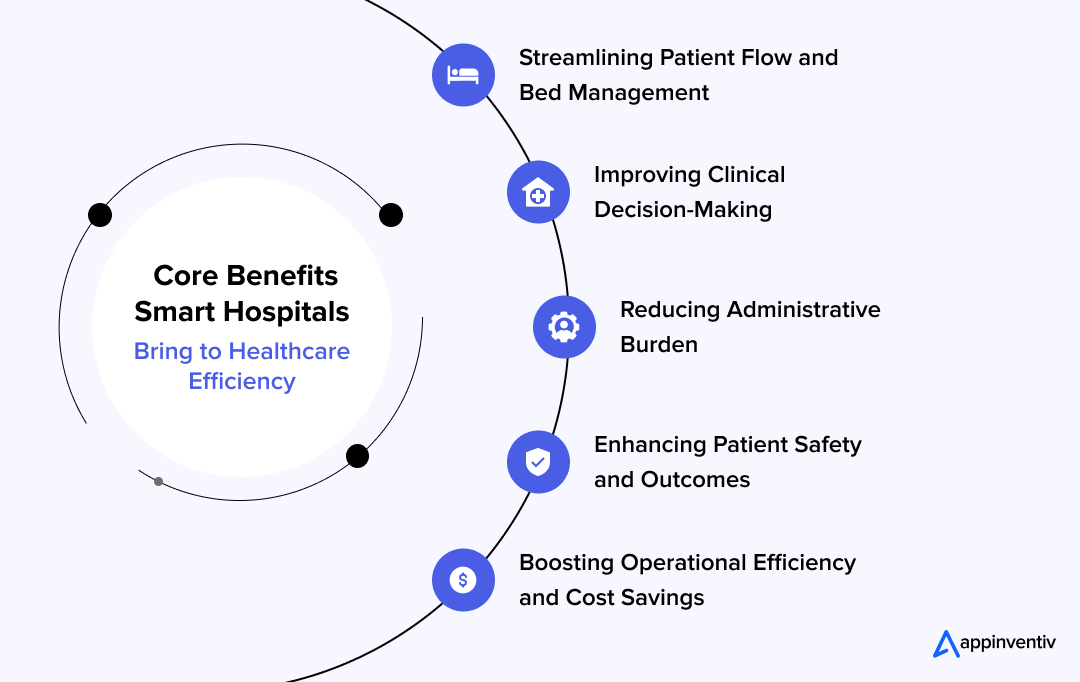
Streamlining Patient Flow and Bed Management
Managing patient admissions, discharges, and bed allocation has always been one of the most complex and time-sensitive functions in hospital operations. Technology in smart hospitals utilizes AI algorithms and real-time data analytics to automate and optimize this process. By analyzing patient inflow trends, acuity levels, and discharge forecasts, AI systems can predict peak times and recommend staffing adjustments in advance. Predictive analytics also helps identify potential discharge delays, ensuring timely transitions and freeing up beds for new patients.
For example, real-time bed tracking dashboards, integrated with EHRs and patient monitoring systems, allow hospital administrators to view occupancy rates, room availability, and cleaning status. This visibility leads to faster bed turnover, reduced ER wait times, and more efficient resource utilization.
Improving Clinical Decision-Making
Smart tech healthcare empowers clinicians with access to evidence-based decision support systems (DSS) that synthesize large volumes of patient data, clinical guidelines, and historical outcomes.
AI-powered DSS tools can alert providers to potential diagnoses, recommend treatment options, flag anomalies in test results, and even simulate outcomes based on different clinical pathways. This leads to more accurate diagnoses, faster decision-making, and fewer medical errors.
Moreover, integrating machine learning models into imaging systems helps radiologists detect anomalies like tumors or fractures with high precision, assisting in early intervention and better patient outcomes.
At Appinventiv, we developed Health-e-People, a multidimensional healthcare platform designed to streamline medical records and deliver user-centric care. By integrating advanced technologies, we created a solution that empowers patients, supports caregivers, and bridges the limitations of legacy systems.
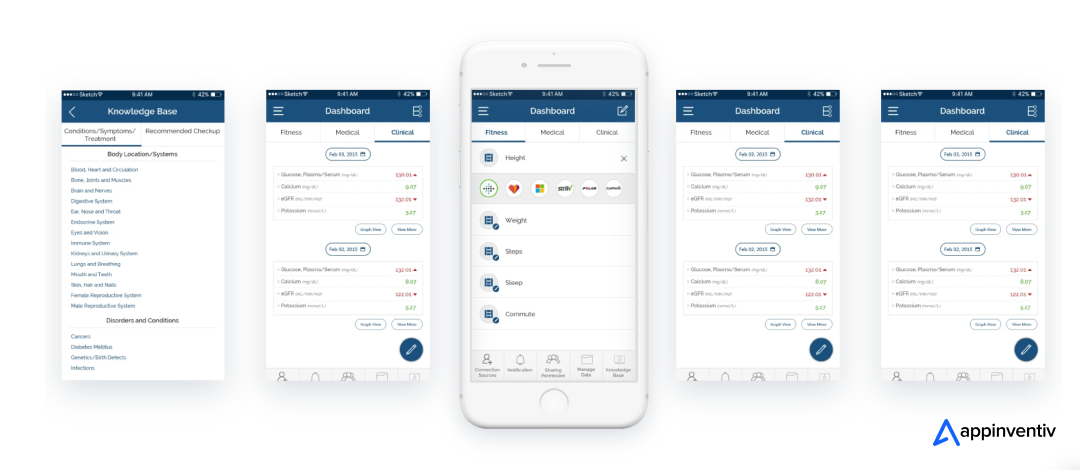
Most importantly, the platform enhances clinical decision-making by offering real-time, data-driven insights, helping providers deliver more accurate, timely, and personalized treatments.
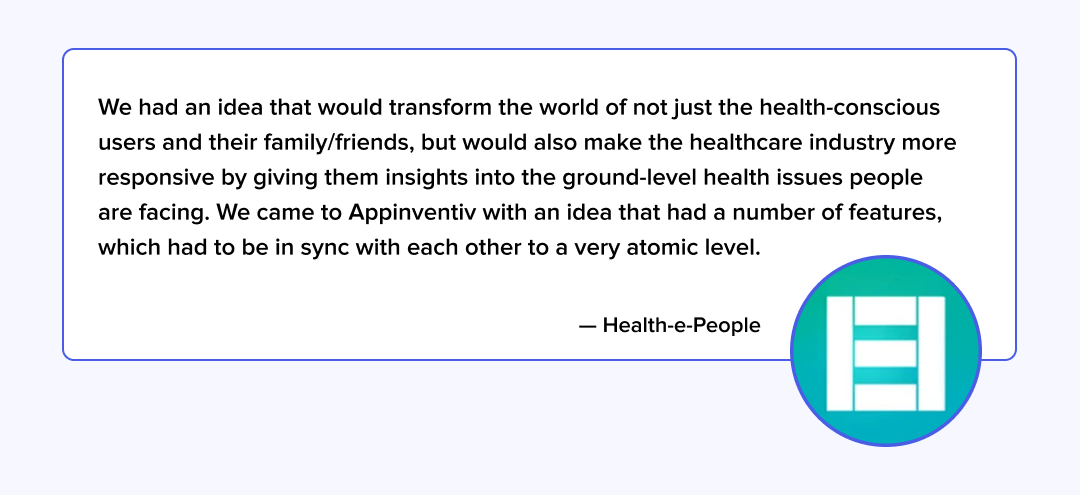
Reducing Administrative Burden
One of the less visible but most impactful changes smart hospital technology brings is automating time-consuming administrative tasks. With the help of AI assistants and Robotic Process Automation (RPA), hospitals can automate tasks like scheduling, billing, claims processing, and patient check-ins.
AI-driven voice recognition tools help clinicians to dictate notes directly into the EHR, eliminating the need for manual data entry. This not only saves time but also improves documentation accuracy and enables physicians to spend more time with patients.
The cumulative effect is significant: reduced paperwork, faster processing times, and improved staff satisfaction, resulting in a more agile and responsive care environment.
Enhancing Patient Safety and Outcomes
Smart technology in healthcare is also redefining how safety is maintained across care delivery. Smart alerts and AI-based monitoring systems continuously analyze patient vitals, flagging early warning signs of deterioration to enable timely interventions. For instance, automated systems can detect sepsis risk, suggest protocol adjustments, or send real-time alerts to attending nurses, reducing critical response time.
Infection control is another major focus area. Automated infection prevention protocols, including real-time air quality monitoring, contactless access controls, and hand hygiene compliance tracking, help minimize hospital-acquired infections (HAIs).
With patient safety being a top priority, these intelligent systems provide layers of proactive protection, improving care outcomes while easing the burden on clinical staff.
Boosting Operational Efficiency and Cost Savings
Beyond the clinical domain, smart technology for hospitals drives substantial efficiencies in hospital infrastructure and facilities management. Energy management systems powered by IoT sensors monitor and optimize heating, lighting, and ventilation across hospital premises, lowering utility costs without compromising comfort or safety.
Meanwhile, predictive maintenance solutions continuously assess the health of critical medical equipment. Instead of relying on routine or reactive maintenance, these tools alert technicians before a breakdown occurs, reducing equipment downtime and costly repairs.
These smart systems not only ensure smoother operations but also extend asset lifespans and generate significant cost savings in the long run, enabling hospitals to reinvest in quality care.
Real-World Use Cases: How Leading Hospitals Are Powering Smarter Healthcare Operations
Across the globe, healthcare organizations are leveraging advanced smart hospital technology to transform traditional hospital operations into smarter, more efficient systems. From predictive analytics and AI-driven diagnostics to Internet of Medical Things (IoMT) and telemedicine, these innovations are enhancing patient care, optimizing workflows, and driving operational excellence.
Here are some of the top real-life examples of how healthcare organizations are embracing technology in smart hospitals to revolutionize their operations and improve patient outcomes.
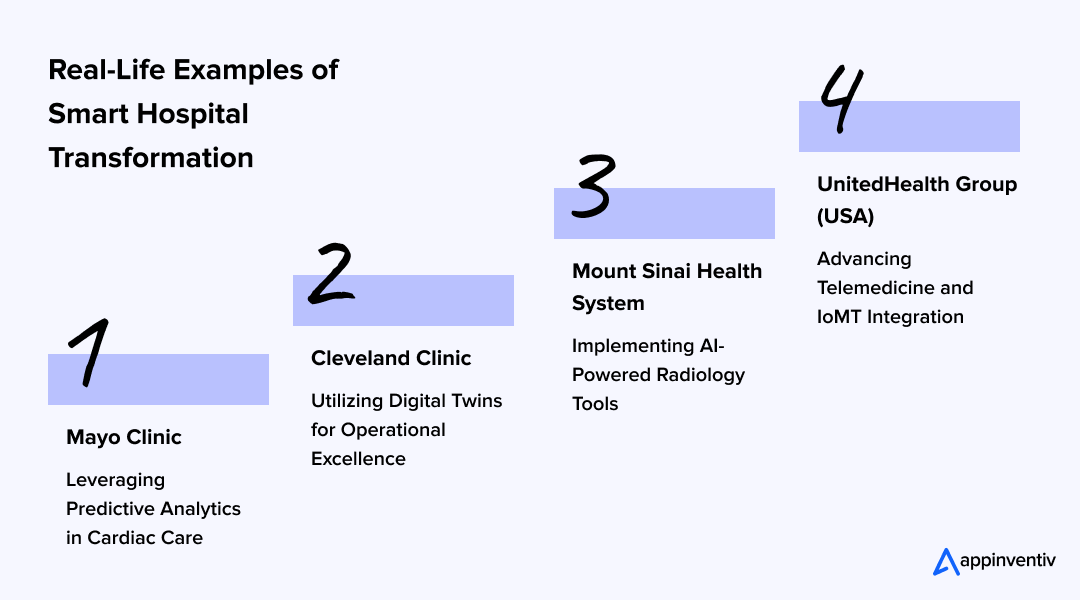
Mayo Clinic – Leveraging Predictive Analytics in Cardiac Care
Mayo Clinic has integrated artificial intelligence (AI) into its cardiovascular services to enhance early detection and treatment of heart conditions. By applying machine learning algorithms to electrocardiogram (ECG) data, clinicians can identify patients at risk of conditions such as left ventricular dysfunction, even before symptoms appear. This is a prime example of technology in smart hospitals, optimizing clinical decision-making and improving patient care.
Cleveland Clinic – Utilizing Digital Twins for Operational Excellence
Cleveland Clinic is pioneering the use of smart tech healthcare, such as digital twin technology, to create virtual models of patient populations and healthcare environments. These digital replicas enable the simulation and analysis of various scenarios, facilitating the identification of health disparities and the optimization of care delivery. By modeling social, environmental, and biological factors, the clinic can develop targeted interventions to improve community health outcomes.
Mount Sinai Health System – Implementing AI-Powered Radiology Tools
Mount Sinai Health System has established a dedicated center for artificial intelligence to advance diagnostic capabilities, particularly in radiology. Smart devices in hospitals, like AI algorithms, assist radiologists in interpreting imaging studies, enhancing the accuracy and speed of diagnoses for conditions such as breast cancer and pulmonary embolism. This integration of AI enables clinicians to make informed decisions, ultimately enhancing patient care.
UnitedHealth Group (USA) – Advancing Telemedicine and IoMT Integration
UnitedHealth Group, one of the largest healthcare companies in the US, has been at the forefront of integrating smart technology for hospitals. By leveraging connected health devices and remote monitoring technologies, they provide healthcare providers with continuous patient data, enabling proactive care management and reducing hospital readmissions. Their telemedicine platform expands access to care, particularly for patients in rural or underserved areas, while enhancing operational efficiency and improving patient outcomes.
What Are the Biggest Challenges Smart Hospitals Face Today?
Smart hospitals represent the future of healthcare, combining digital technologies, data-driven decision-making, and automation to deliver more efficient, personalized, and responsive care. However, the road to implementing these innovations is not without its hurdles. Here’s a closer look at the common challenges with smart hospitals and practical strategies to overcome them.
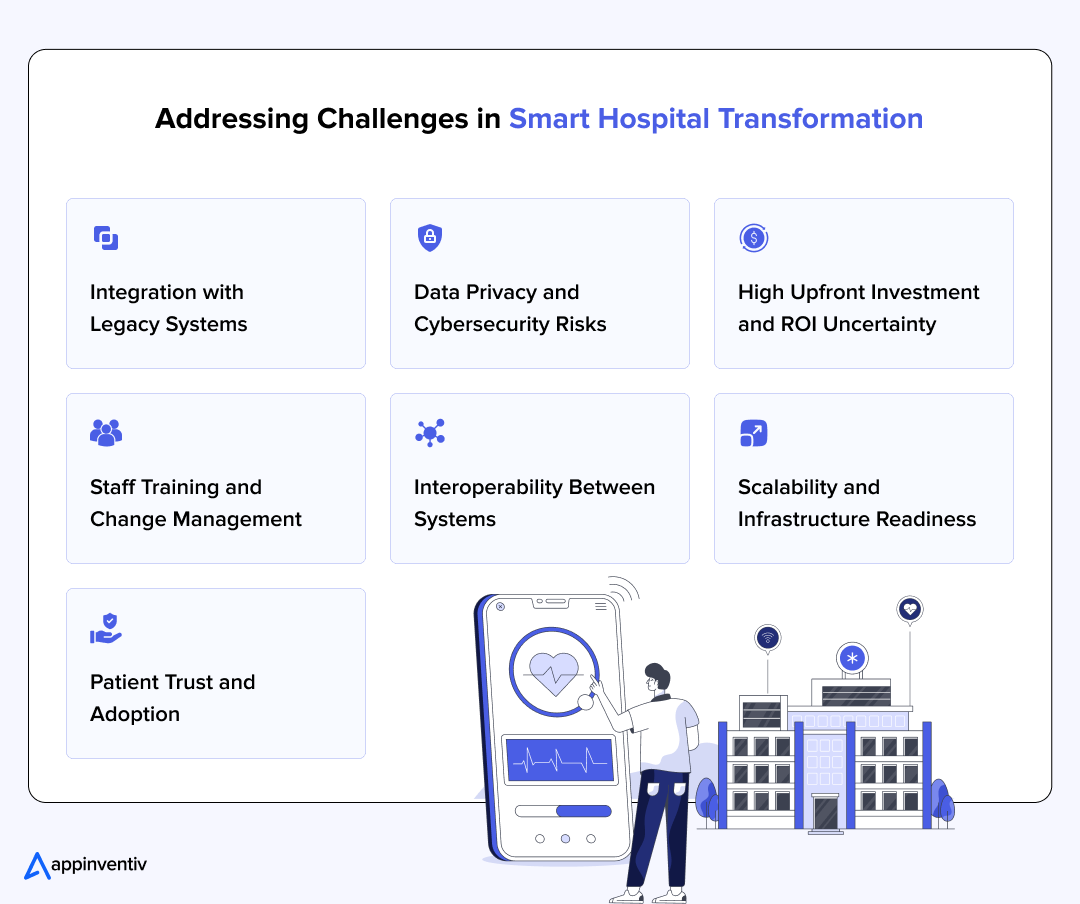
Integration with Legacy Systems
Challenge: Most hospitals operate with outdated infrastructure, siloed databases, and incompatible software. Integrating advanced smart hospital technology into these legacy systems is complex and often leads to workflow disruptions.
Solution: Adopt a phased integration strategy using middleware or APIs that allow old and new systems to communicate. Engage IT consultants to map existing infrastructure, prioritize critical workflows, and gradually modernize operations without downtime.
Also Read: A Guide to Modernizing Legacy Systems in Healthcare
Data Privacy and Cybersecurity Risks
Challenge: With smart hospitals relying heavily on digital records, IoT, and cloud systems, they become prime targets for cyberattacks. A single breach can compromise patient data and damage institutional credibility.
Solution: Implement end-to-end encryption, role-based access controls, and multi-factor authentication. Regular security audits, real-time threat monitoring, and strict adherence to data protection laws like HIPAA and GDPR are essential for trust and compliance.
Also Read: Why Telehealth Security is Non-Negotiable for Patient Trust and How to Achieve It
High Upfront Investment and ROI Uncertainty
Challenge: The cost of upgrading to smart technologies for hospitals, including IoT devices, cloud platforms, and AI-driven software, can be prohibitive for many healthcare facilities, especially in the public or rural sectors.
Solution: Conduct a detailed ROI analysis by identifying long-term savings in areas like staffing, hospital readmissions, and operational efficiency. Explore public-private partnerships and healthtech grants to offset initial costs, and prioritize scalable solutions that grow with the organization.
Staff Training and Change Management
Challenge: Introducing new technologies often leads to resistance among hospital staff, particularly those unfamiliar with digital tools. This can slow down adoption and impact patient care.
Solution: Design a structured training program tailored to each staff category. Involve clinicians and administrators early in the planning process to build ownership. Provide ongoing support and emphasize the benefits of smart hospital systems in reducing workload and improving outcomes.
Interoperability Between Systems
Challenge: A smart hospital needs its various departments—radiology, emergency, pharmacy, and billing to share real-time data seamlessly. Interoperability remains a persistent issue.
Solution: Implement standards like HL7 FHIR (Fast Healthcare Interoperability Resources) to ensure smooth data exchange. Utilize cloud-based platforms with open APIs to integrate disparate systems and facilitate real-time coordination.
Scalability and Infrastructure Readiness
Challenge: As hospitals expand or face sudden surges (such as during a pandemic), their systems must be prepared to scale. Not all smart hospital technology solutions are built with scalability in mind.
Solution: Choose modular, cloud-native architectures that can scale both vertically and horizontally. Prioritize technologies with auto-scaling features and ensure infrastructure supports data-heavy applications such as AI and IoT.
Patient Trust and Adoption
Challenge: Patients may be skeptical of AI-driven decisions or concerned about data collection. Resistance to tech-based healthcare could hinder engagement and treatment adherence.
Solution: Foster transparency around how data is used and stored. Offer patients access to their own data via secure apps or portals, and communicate the benefits of smart technology for hospitals in enhancing safety and personalization.
Equip your facility with future-ready healthcare technologies today.
How Healthcare Providers Can Get Started With Smart Hospital Transformation
Implementing smart hospital technology is a complex journey that requires careful planning and strategic execution. Healthcare providers seeking to adopt this transformation should adopt a structured approach to ensure success. Here are the essential steps to get started:
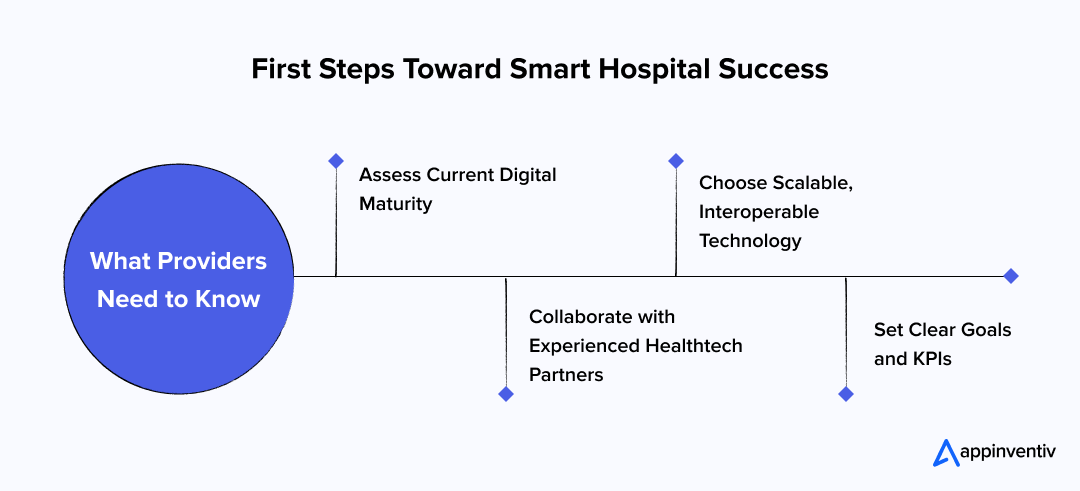
Assess Current Digital Maturity
Before adopting new technologies, it’s crucial for healthcare organizations to evaluate their existing digital infrastructure, workflows, and staff readiness. This assessment helps identify strengths, gaps, and pain points that smart technology in healthcare can address.
Tools like digital maturity models or frameworks can offer a comprehensive overview of technological capabilities and operational readiness.
Set Clear Goals and KPIs
Defining specific, measurable objectives is key to driving meaningful change. Whether it’s reducing patient wait times, improving clinical decision-making, or enhancing operational efficiency, setting clear goals provides direction.
Establishing key performance indicators (KPIs) such as patient satisfaction scores, readmission rates, or equipment downtime helps track progress and justify investments, making the process for technology integration in hospitals smoother.
Choose Scalable, Interoperable Technology
Smart technology for hospitals should be scalable to grow with the organization’s needs and interoperable to integrate seamlessly with EMRs, EHRs, telehealth platforms, and medical devices.
Adopting open standards, such as HL7 FHIR, ensures smooth data exchange and prevents vendor lock-in, allowing for flexibility and future upgrades without disruption. These examples of smart technology in healthcare, such as AI-driven medical diagnosis and IoT-enabled devices, can significantly elevate healthcare delivery.
Collaborate with Experienced Healthtech Partners
Partnering with technology vendors and consultants who specialize in healthcare innovation can accelerate implementation and reduce risks. Experienced healthtech partners bring domain expertise, regulatory knowledge, and proven methodologies that help customize solutions to specific clinical and operational contexts. Collaboration also supports staff training, change management, and ongoing support, ensuring long-term success.
Ready to Transform Healthcare Delivery with Appinventiv’s Smart Hospital Expertise?
Tomorrow’s hospitals are poised to move far beyond simply treating illness. They will predict patient needs, personalize every aspect of care, and automate complex workflows to deliver faster, more accurate, and more human-centered outcomes.
As technologies like real-time data processing, ambient intelligence, and advanced automation continue to evolve, we are entering an era where operational excellence and exceptional patient experiences are not just aspirations but expectations. This is the future of smart hospitals, where technology and human care converge to create highly efficient, patient-centric healthcare environments.
This transformation, however, requires more than just technology. It calls for a healthcare innovation partner who understands the unique challenges of the industry and can bridge the gap between vision and execution. Appinventiv stands at the forefront of this movement as a leading medical software development company, helping providers harness the full potential of digital healthcare.
In addition to building intelligent hospital management systems and EHR integrations, our telemedicine app development solutions enable care providers to consult, diagnose, and treat patients remotely, ensuring continuity of care regardless of location.
With successful innovations like Health-e-People, DiabeticU, and Soniphi, which analyzes vocal biomarkers for real-time chronic care support, we have consistently delivered intelligent, patient-focused healthcare solutions that drive measurable impact across the care continuum.
Talking about DiabeticU—an all-in-one diabetes management application, we designed it to sync with wearable devices seamlessly. The app provides users with personalized meal planning, fitness guidance, medication reminders, and real-time blood sugar monitoring.
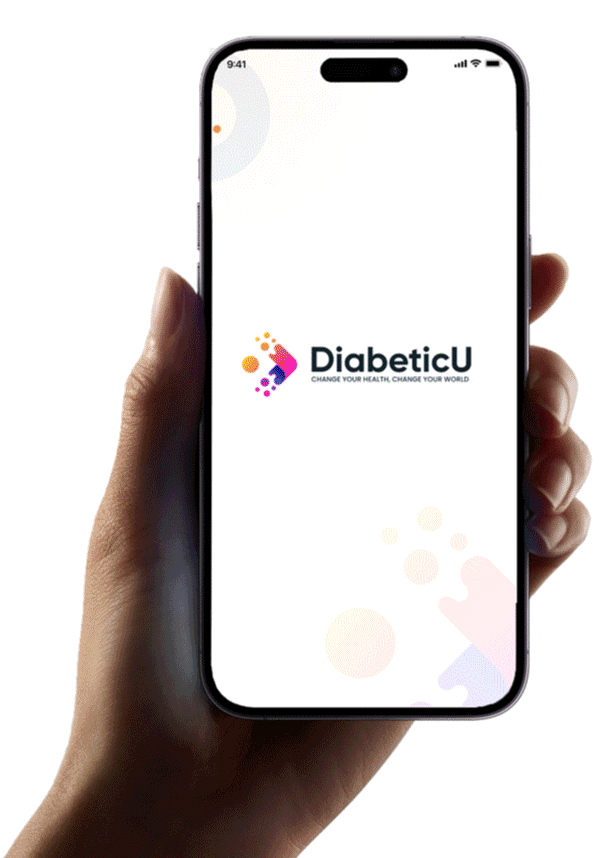
By merging continuous health data with individualized insights, DiabeticU empowers users to take control of their condition, resulting in improved health outcomes and a significantly enhanced quality of life.
If you are looking to redesign your healthcare operations for the future, improve care delivery, and stay ahead of the curve, our team is ready to help you lead the change with clarity, empathy, and speed.
Let us turn your smart hospital vision into reality. Connect with our experts today and take the first step toward transforming care.
FAQs
Q. How to prepare for smart hospital transformation?
A. Here are some of the ways you can prepare for smart hospital transformation:
- Assess Needs: Identify operational inefficiencies and prioritize areas for digital transformation, such as patient monitoring or data management, using smart technology in healthcare.
- Engage Stakeholders: Involve key personnel (clinicians, IT, administrators) early to ensure the transformation aligns with clinical needs and operational goals, leveraging smart technology for hospitals.
- Plan Implementation: Create a phased approach, starting with areas that deliver quick benefits, like patient flow management or predictive analytics, using smart hospital technology.
- Ensure Integration: Utilize platforms with open APIs to facilitate seamless integration with existing systems and prevent data silos.
- Train Staff: Provide comprehensive staff training to ensure effective use of new technologies and minimize resistance.
Q. Are smart hospitals secure against cyberattacks?
A. Smart hospitals, leveraging smart technology in healthcare like IoT, AI, and cloud computing, face cybersecurity risks due to the vast amount of sensitive data and interconnected devices. To mitigate these risks, hospitals should implement encryption, multi-factor authentication, real-time threat monitoring, and ensure compliance with HIPAA and GDPR through regular cybersecurity audits.
Q. How much does it cost to develop a smart hospital app?
A. The cost of developing a smart hospital app depends on factors like the hospital’s size, the scale of digital transformation, and the specific technologies being integrated. For small-to-medium-sized hospitals, developing an app may cost between $100,000 to $500,000, focusing on features such as patient monitoring, appointment scheduling, and data management, using smart tech healthcare solutions.
For larger hospitals or healthcare systems, the cost can range from $1 million to $5 million, incorporating more advanced functionalities such as AI-driven diagnostics, IoT device integration, cloud-based patient data management, and support for smart devices in hospitals, including wearables and robotic surgeries.
The return on investment (ROI) for a smart hospital app can be substantial, with improvements in patient care, operational efficiency, and cost savings through automation, real-time data analytics, and enhanced decision-making capabilities.
Q. How is a smart hospital different from a traditional hospital?
A. A smart hospital differs from a traditional hospital by integrating smart technologies for healthcare like AI, IoT, and real-time data analytics to enhance patient care and hospital operations. Unlike conventional hospitals that rely on manual processes and paper records, smart hospital systems automate tasks, improve diagnostics with AI, and use smart devices in hospitals for continuous patient monitoring.
This leads to better data integration, predictive maintenance, and faster decision-making. Essentially, smart hospitals are more connected, efficient, and data-driven, providing improved care and streamlined operations.
Q. How does smart technology improve patient care and hospital efficiency?
A. Smart hospital technologies enhance patient care by enabling real-time monitoring of patient vitals, predictive analytics for early disease detection, and AI-assisted diagnostics for more accurate treatment. Automation helps reduce human error, enabling faster and more precise decision-making.
Additionally, hospital technologies optimize efficiency by streamlining patient flow, resource management, and bed assignments, ultimately improving operational costs and reducing wait times. AI and automation in administrative functions like scheduling and billing further reduce workload and allow staff to focus more on patient care.
Q. What are some of the top trends driving smart hospitals?
A. Here are the future trends driving smart hospitals:
- AI-Driven Predictive Health Models
- Autonomous Healthcare Robotics
- Next-Gen Wearables
- Quantum Computing for Healthcare
- Personalized Medicine Powered by Genomics
- Fully Integrated Virtual Hospitals
- Blockchain-Powered Medical Records
- Smart Environments with Ambient Intelligence
- AI-Assisted Decision Support Systems
- Energy-Efficient and Sustainable Smart Buildings


- In just 2 mins you will get a response
- Your idea is 100% protected by our Non Disclosure Agreement.
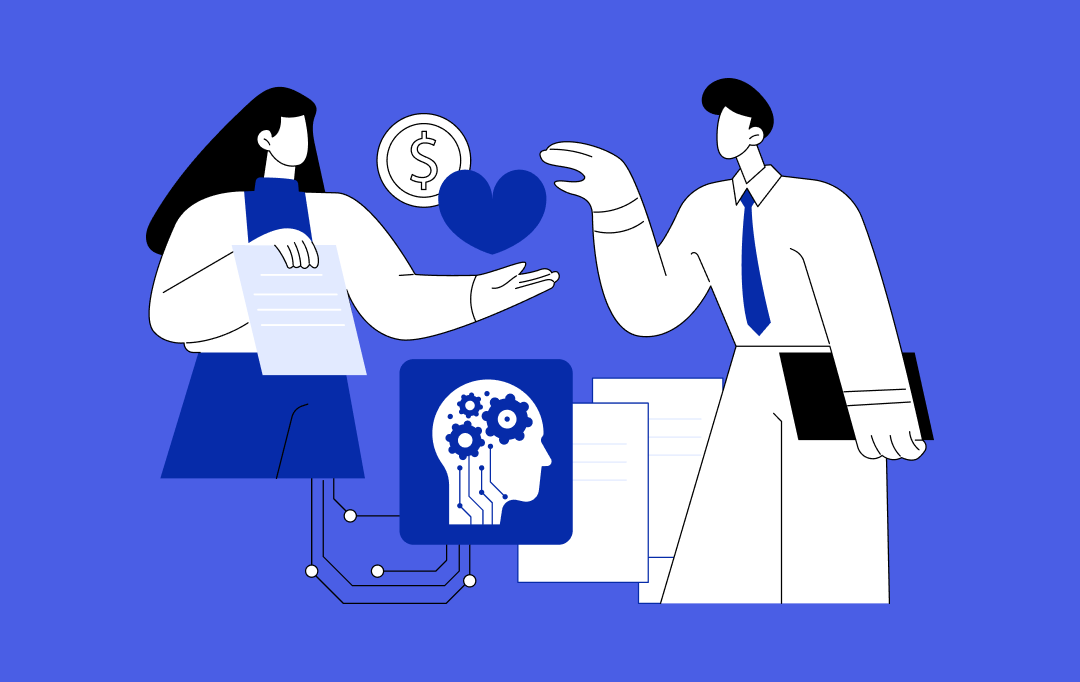
Change Management in Healthcare: Principles, Processes, and Models
Key Takeaways Change in healthcare fails quietly when ownership, workflow alignment, and follow-through are missing. Successful change management in healthcare focuses on adoption, not just system implementation. Clinical workflows and workforce capacity determine whether transformation sticks or stalls. Governance, clear accountability, and post-go-live support matter more than the model used. Sustainable healthcare transformation depends on…
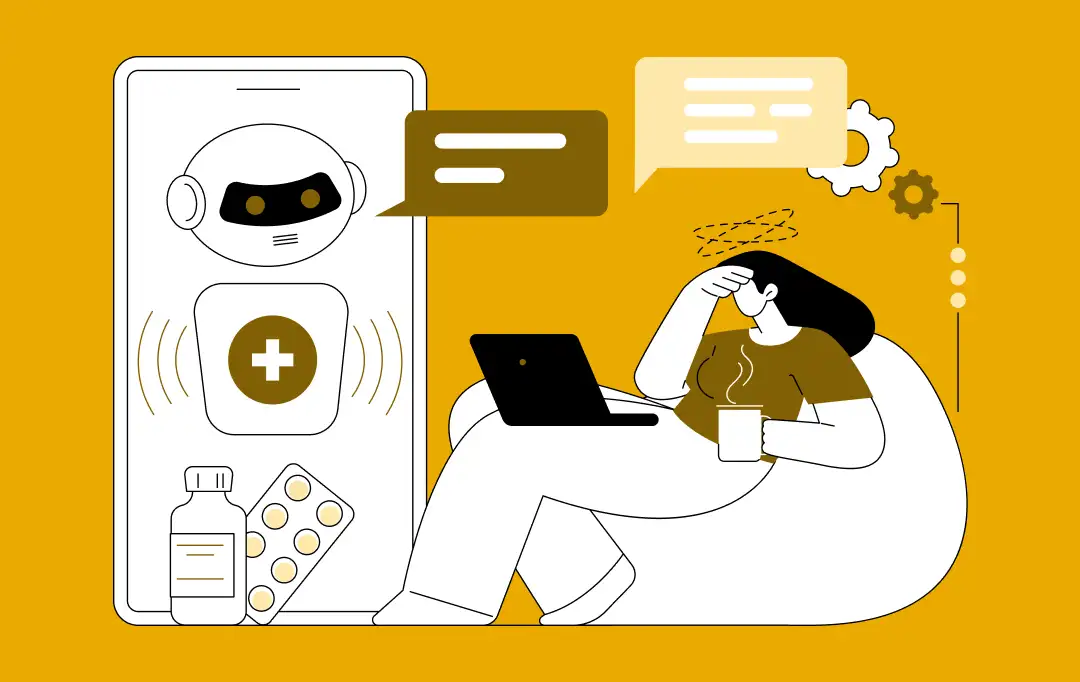
A Practical Guide to Building Your Mental Health Chatbot - Use Cases, Cost, & ROI
Key takeaways: Mental health chatbots work when they know their limits. They’re most useful as a gentle first step, not as a stand-in for real care. Good chatbot design is more about judgment than AI. Clear boundaries, calm responses, and safety matter more than smart language models. Enterprises invest in chatbots to make support easier…
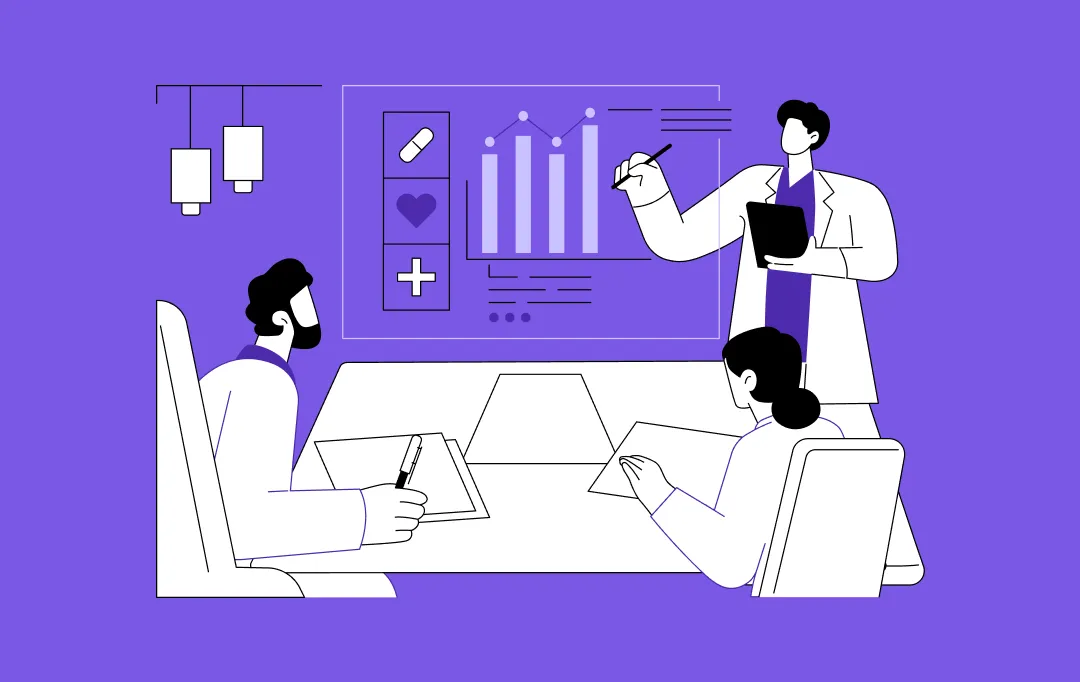
How To Hire the Right Healthcare Developers As Per Your Business Needs?
Key Takeaways The guide to the step-by-step approach to recruiting the right healthcare software developers to meet your business requirements. In-depth dissection of the major technical skills, certifications and healthcare-specific expertise required in developers. Guidelines for carrying out the evaluation of candidates using portfolios, technical interviews, and trial projects. Industry-specific ERM approaches help address regulatory,…


























